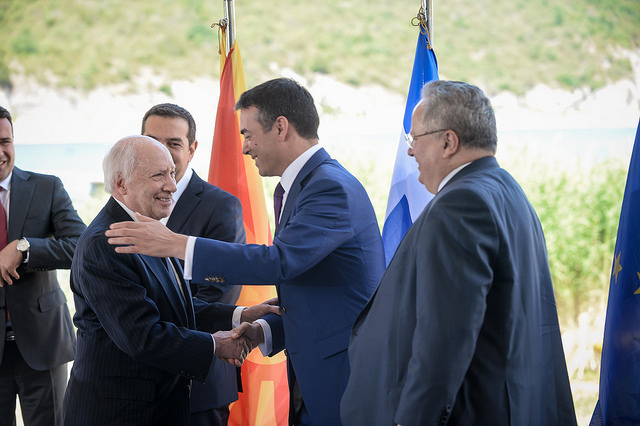UN mediator Matthew Nimetz held a briefing for the press in the United Nations, to detail his views on the Macedonian name issue, after what was announced as its “successful completion”. Never the less, Nimetz warned that much additional work will be needed to complete the process, saying that the name of the country is just the tip of the iceberg.
The Prespa agreement has periods of implementation and has forward looking aspects. It has committees to look at school books because one of the concerns is irredentism and demonization of one’s neighbor. And the change of name itself takes a long of time, every passport has to change, every drivers license has to change, diplomas of universities that say Republic of Macedonia now have to say Republic of North Macedonia, marriage licenses, plaques on buildings.. So, there’s a period of implementation and it will take a certain amount of time. Also, the relationship between the two peoples and two countries will take time. Issues on commercial use of Macedonia, if you go to a liquor store and ask for wine from Macedonia, is it Greek, is it from the Republic of North Macedonia?, Nimetz said before pointing out to what is likely the main unresolved issue of the dispute – whether Macedonians can be called – Macedonians.
This issue was raised in both countries recently as the BBC aired a rare news report on the persecution of ethnic Macedonians in Greece. Macedonia responded to the BBC asking that the few mentions of the term “Macedonians Slavs” are removed in line with media guidelines the Macedonian Foreign Ministry prepared to ask media outlets to exclusively use the term Macedonians. Greek authorities, on the other hand, were outraged by the mention of both the minority and the term Macedonians being used to describe them.
It is very hard for Greeks to use the word Macedonian to refer to the folks from the Republic of North Macedonia, because they use the word Macedonian to refer to the Greek people of Macedonia. So there are going to be issues between the two countries and peoples, Nimetz said.
Despite the task ahead, Nimetz said that he is satisfied with the fact that the Prespa treaty was signed, after 25 years of negotiations and blockades. He praised the leftist leaders of Macedonia and Greece who signed the treaty, despite the opposition of majorities in both countries.
Most credit goes to the two Prime Ministers who determined that this is something that ought to get resolved and that they would take responsibility to do it. It will deal with the school books, irredentist ideas, language, the period of implementation, and hopefully this leads to good relations between the two countries and a more secure region, Nimetz said, pointing that Greece is now bound to allow Macedonia to join NATO and open EU accession talks.






Comments are closed for this post.